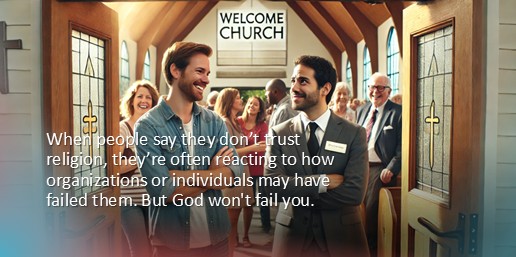David just talked with a first-time visitor who complained, “This church is not right for me because I don’t trust religion.” He told us, “Many people feel uneasy about religion because they see it as an institution full of flaws or hypocrisy.” But from a biblical viewpoint, the heart of Christianity is not an institution—it’s a personal relationship with God through Jesus Christ. Therefore, when someone says, “I don’t trust religion,” he tries to approach the conversation from some of these key ideas:
God Desires Relationship Over Ritual – The Bible tells us, “God does not dwell in temples made by man” but rather in the hearts of His people (see Acts 17:24 and 1 Corinthians 3:16). In other words, true faith isn’t about buildings, ceremonies, or keeping a set of strict rules. It’s about knowing God personally and trusting Him.
The Bible Is Our Guide – According to 2 Timothy 3:16-17, Scripture is sufficient for teaching us about who God is, correcting us when we stray, and guiding us to live righteously. When we put our focus on God’s Word rather than on flawed human institutions, we find a solid foundation that won’t fail us.
Christ-Centered Community Is Important – The Bible describes followers of Jesus as a family or fellowship (Ephesians 2:19–22). We gather in churches not just for ritual but for encouragement, prayer, and love. Hebrews 10:24–25 urges us to meet together, so we can support one another and grow in faith. The key is finding a place where people genuinely practice love (John 13:34–35), rather than just going through religious motions.
Real Love Shows Genuine Faith – Jesus said people would recognize His disciples by how they love one another (John 13:35). This is the core of pure religion—living out love, helping those in need, and keeping ourselves close to God (James 1:27).
Encouragement to Draw Closer to God – Finally, the most important thing is that we don’t have to win this argument. We can allow each person to be transformed by the sanctifying power of God. Therefore, we should be encouraging them to develop a closer walk with Jesus Christ. As James said, “Submit yourselves, then, to God. Resist the devil, and he will flee from you. Draw near to God, and He will draw near to you.” Here are four practical ways to continue growing in faith:
- Read the Bible daily: Let God’s Word guide and shape your heart.
- Develop a strong prayer life: Talk to God openly and honestly.
- Connect with other Christians: Look for a healthy church or small group that truly cares for one another.
- Share your testimony: Tell others what God has done in your life, and let them see His love through your actions.
When people say they don’t trust religion, they’re often reacting to how organizations or individuals may have failed them. But please remember: God Himself will never fail you (Deuteronomy 31:6). If you seek Him personally and surround yourself with sincere believers who care for one another, you can experience the true purpose behind “religion”—a life-changing relationship with Jesus and a loving community that helps you walk with Him.
As always, if you have anything to add to this subject or criticize about this approach, please write to us or join the conversation in the comments below.
Digging Deeper
- 2 religions of the world illustrated by Invictus vs My Captain – Two religions: I am the master of my fate; I am captain of my soul versus Christ is the captain of my soul.
- Is the Church an organization or an organism? – The organism of the body of Christ is composed of many different members who have been supernaturally added by the power of the Holy Spirit.
- Biblical Christianity vs Religion of Humanism – Biblical Christianity and Religion of Humanism have incompatible world views on God, human nature, morality, and human reasoning.
- A form of godliness (show of religion, piety, holiness, outward righteousness) – Understand: they will act religious, they will appear to have a godly life, they will have a form of godliness, but denying the power: from such turn away.
